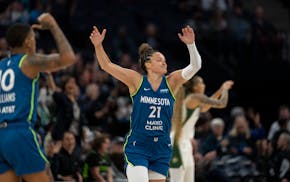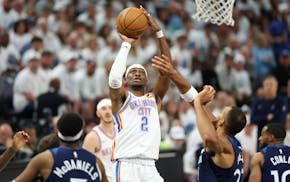That the Timberwolves pulled off a victory in Game 3 of the Western Conference finals Saturday at Target Center should not be shocking, given that they were down 2-0 in their series with Oklahoma City and figured to be playing with a certain desperation.
The 42-point final margin, though, was stunning. The Wolves not only wrestled back control of the narrative but also surely planted at least some doubt for a team that went 68-14 during the regular season.
What does a pivotal Game 4 Monday at Target Center have in store? Let's take a look at five key story lines:
Was Saturday the start of a trend or just a mirage?
Oddsmakers would say it was the latter. The Thunder are 3.5-point betting favorites in Monday's Game 4 and still are overwhelming favorites to win the series (ESPN's Basketball Power Index gives the Wolves about an 11% chance of advancing to the NBA finals, even after Saturday's win).
Even Wolves fans after Saturday's 143-101 win seemed to be of this mind: That was great, but do it again. The start of the game and the pivotal third quarter should tell a lot of the story again, just as I predicted for Game 3.
Can Chris Finch push all the right buttons again?
A lot of us (myself included) were critical of Wolves coach Chris Finch for sticking with a tight and struggling eight-man rotation in a Game 2 loss. Finch saw the light in Game 3, giving Terrence Shannon Jr. some impactful second-quarter minutes (while being rewarded when TSJ popped in nine quick points). Finch and his staff also dialed up some different defensive coverages that made MVP Shai Gilgeous-Alexander (14 points, minus-32) far less comfortable than he had been earlier in the series. Minnesota will need more of that coaching savvy in Game 4 when OKC figures to counter-punch.
Will the Wolves continue to make shots?
Those of us who analyze sports for a living sometimes tend to make things too complicated. Basketball games are often won or lost based on one simple fact: Which team shot the ball better? It was Oklahoma City in Games 1 and 2, and it was certainly the Wolves in Game 3, who made 50% of their threes (20 of 40) after making less than 30% (26 for 90) combined in the first two games. The Wolves played well and shot well Saturday. Can they get more of the same Monday, particularly from critical bench players who came alive Saturday? That will tell a lot of Monday's story.
Who will be the more physical team?
Oklahoma City coach Mark Daigneault and Thunder players talked after Saturday's game about the Wolves being the more physical team and taking the action to OKC in the blowout. Sometimes that can be code for "we didn't play very well and we can't pinpoint why," but in this case we should almost certainly expect the Thunder to come out and try to set a much more physical tone early in Monday's game. Can the Wolves match or surpass that? And will it lead to some chippy play that could lead one or both teams into foul trouble (or some post-whistle dust-ups)? The team that can channel its physical play the right way could wind up the Game 4 winner.
Clutch time?
While the Wolves actually have outscored OKC by one point in the series, none of the games have been close in the final minutes. Game 4 has the potential to be different given the stakes. A Wolves win would even things up and push this much closer to a toss-up series, while a Thunder win would give them a 3-1 lead and a massive edge. It feels like this could be the best game of the series, the type of game that is decided by a handful of key possessions in the last four minutes. The Wolves struggled in games like that during the regular season, but they have been great in similar situations during the postseason. The Thunder can win a lot of different ways, but they are not as playoff-tested as Minnesota. How would both teams respond in the clutch? We might find out Monday.

Lynx beat Storm to remain undefeated as McBride returns
Behind Joe Ryan, Twins stop Rays' streak with 4-2 win

Bader briefly sidelined from Twins' lineup after injury from broken bat

Reusse: Bring on boos, but Gilgeous-Alexander is a deserving MVP

